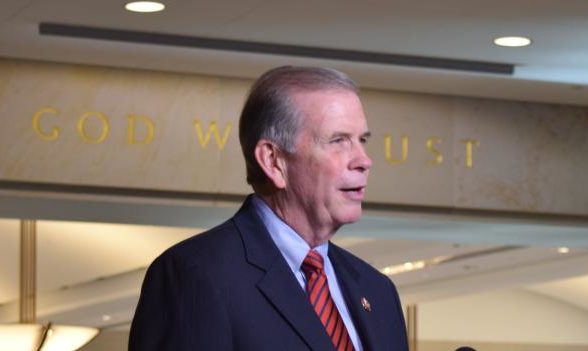Posts tagged Taft-Hartley Act
Unions’ power ebbs and flows
November 6, 2023 // Unionization efforts have expanded but many are taking place where there is little history of organized labor, creating a higher bar for workers. Colvin points to Starbucks workers who have seen union drives clipped in the last year. Starbucks has been accused of chilling organization by closing unionized stores and firing pro-union workers. There are also limits for organizers under current labor law. That means that what worked in the auto workers' labor campaign, for example, may not be possible for other industries.

The Cyberpicket: A New Frontier for Labor Law
June 12, 2023 // a cyberpicket would alert potential customers to a labor dispute and put them to the choice of whether to continue transacting with the business. Instead of encountering rows of workers outfitted with signs and pamphlets, however, e-shoppers would come across a notification that materializes at a site’s landing page — the business’s “entrance.” The technology needed to implement a cyberpicket breaks no new ground. In fact, it’s already widely utilized by online businesses for compliance with the European Union’s (EU) “Cookie Law,” which requires that websites give visitors the right to refuse data tracking.14 So-called “consent banners” — now familiar fixtures for netizens across the pond15 — present a tried-and-true template for the cyberpicket. Not only is the cyberpicket a viable alternative to its in-person counterpart, it’s a right owed to employees of online businesses. This Note sharpens the concept of a cyberpicket by expanding on its legal justification, expected benefits, and possible challenges.
Are Unionized Gig Workers The Future Of Work?
June 2, 2023 // Additionally, some unions—because of a lack of resources—aren’t able to take the most direct approach to helping gig workers. “Unfortunately, right now there are some unions that have taken a ‘strategic’ approach of trying to work with the companies and become their labor partners,” says Dryburgh. “In May 2021, they tried getting a law passed in NYC that would provide Independent Drivers Guild and Transport Workers Unions fees for representing workers that would come from fares and delivery fees. The problem with these laws is that while they provide immediate benefits to workers, they create these carveouts that prevent app-based workers from being classified as employees. These kinds of deals can have irreparable consequences for the rest of the labor movement. If the new standard of whether you are an employee depends if you get your job through an app, all W2 employees are in trouble.”
A Mandate for Labor Error: Big Labor Radicalizes
May 25, 2023 // s for claims by some conservatives that embracing unions will drive electoral success, these notions arise from populist factions’ overinterpretation of the 2016 election results and under-interpretation of elections since then. Many note that in his 2016 campaign, Donald Trump’s efforts in the upper Midwest states of Wisconsin, Michigan, and Pennsylvania were aided by his moderate stances on economic issues relative to the positions of prior Republican candidates like Mitt Romney. And this is generally true—but not on labor-relations issues.

The FTC’s Indefensible Position on Collective Bargaining
April 19, 2023 // In remarks last week at the University of Utah School of Law, FTC Commissioner Alvaro Bedoya argued that independent contractors should be allowed to bargain collectively. He acknowledged that courts have always treated collective bargaining by contractors as illegal under federal antitrust law. But he claimed that these courts have made a mistake: in fact, Congress never meant to stop small contractors, like truckers or plumbers, from forming a union and bargaining together. Bedoya’s interpretation would upset a century of careful balancing between antitrust and labor policy. It would also expose the contractors themselves to serious risks of abuse. And it would undermine well-established rules against collusion, price fixing, and other restraints on trade. To see why Bedoya is so wrong, you have to understand labor law and antitrust law’s tangled history. Let’s start with section 1 of the Sherman Antitrust Act. Adopted in 1890, section 1 banned all contracts and conspiracies in restraint of trade. It did not, however, define trade restraints. Instead, it incorporated common-law standards. Under the common law, unions were treated no differently from any other combination of buyers or sellers. If they conspired to fix labor prices, they violated the law. And collective bargaining could be seen as one form of price fixing. As a result, the law sometimes treated unions as, essentially, labor cartels.

PRO Act puts union leadership ahead of workers
March 6, 2023 // Despite its name, the PRO Act fails to “protect the right to organize” — a right that exists under current law and is respected by people on both sides of the aisle. Rather, the legislation would undo existing reforms adopted under the Taft-Hartley Act of 1947, which helped to curb union violence, coercion, and other criminal activity that plagued labor unions at that time. Unfortunately, the PRO Act would empower union leadership to engage in the same reckless, short-sighted, and dangerous tactics that have disrupted our economy, making it more difficult and costly to invest in our workforce. Research from the American Action Forum has even found that if the PRO Act becomes law, employers could face more than $47 billion in new annual costs, further jeopardizing the economic recovery following the disruptions of the COVID-19 pandemic. The pandemic has exposed weaknesses in our supply chain, and the PRO Act would only further weaken resiliency and could result in more shortages and bare shelves. The special interest bill would also undermine the fundamental rights of workers. Rather than empowering workers, the bill would force them into one-size-fits-all union contracts and subject both workers and job creators to union harassment, infringing on workers’ individual rights. First, the bill allows union leadership to access private information from employees without their consent, giving them free rein to contact, harass, and coerce their workers. It also limits the rights to a secret ballot — a core tenet of American democracy — which will further endanger workers who may have reservations about joining a union. Privacy, secret ballots, and flexibility should all be expected and guaranteed in the 21st-century workplace. Additionally, the bill would abolish right-to-work laws in 27 states,
Right-to-work resurfaces at the Montana Legislature, as do dozens of pro-union opponents
February 22, 2023 // The bill, Buffalo Republican Rep. James Bergstrom’s House Bill 448, would prohibit private sector union contracts that require employees to join a union or otherwise pay fees for their representation. It’s the latest legislative swing at unions in Montana, a state with a deep history of labor activism that has repeatedly resisted right-to-work legislation even as national union density has declined and neighboring states have passed similar laws. “Blood has been spilled on the streets of my district for the rights we have today,” Rep. Derek Harvey, D-Butte, a union firefighter, told more than 70 union workers and officials representing a wide variety of trades on the Capitol steps Friday.
HarperCollins workers have spent more than 50 days on strike. Is it working?
January 24, 2023 // But if the HarperCollins union gets the wages and protections they're asking for, it could set a higher standard for the rest of the publishing industry going forward, even if they're not unionized. It's an uphill climb, though. The striking workers have been without a paycheck for months now, but they're already planning another big rally in February.
11 Plead Guilty in Construction Union Bribery Scheme
December 23, 2022 // Cahill was the ring leader of the scheme, accepting envelopes stuffed with cash in restaurant restrooms from a construction contractor whose name was not revealed by the attorney’s office. Cahill introduced the contractor to many of the 10 others who pleaded guilty. Some of the other union officials accepted anywhere from thousands to tens of thousands of dollars in illegal payments. Cahill also directed the contractor on how to win union favors yet not have to hire union workers. According to the attorney’s office, the contractor would pay the bribes to the union officials to win projects in the jurisdiction of Steamfitters Local 638 in New York City and Long Island and Plumbers Local Union 200 in Nassau and Suffolk counties.

CT’s ‘captive audience’ law challenged in federal lawsuit
November 2, 2022 // Connecticut’s ban on “captive audience” meetings, which unions say are used to thwart organizing, is unconstitutional and a preemption of federal labor law, a coalition led by the U.S. Chamber of Commerce claimed in a lawsuit filed Tuesday in U.S. District Court in Hartford. The lawsuit, joined by the Connecticut Business and Industry Association and trade groups representing retailers and others, says the ban violates free-speech and equal-protection rights under the Constitution by “chilling and prohibiting employer speech” with their workers. The defendants in the lawsuit are Commissioner Danté Bartolomeo of the state Department of Labor, the department itself, and Attorney General William Tong. Chris DiPentima,
